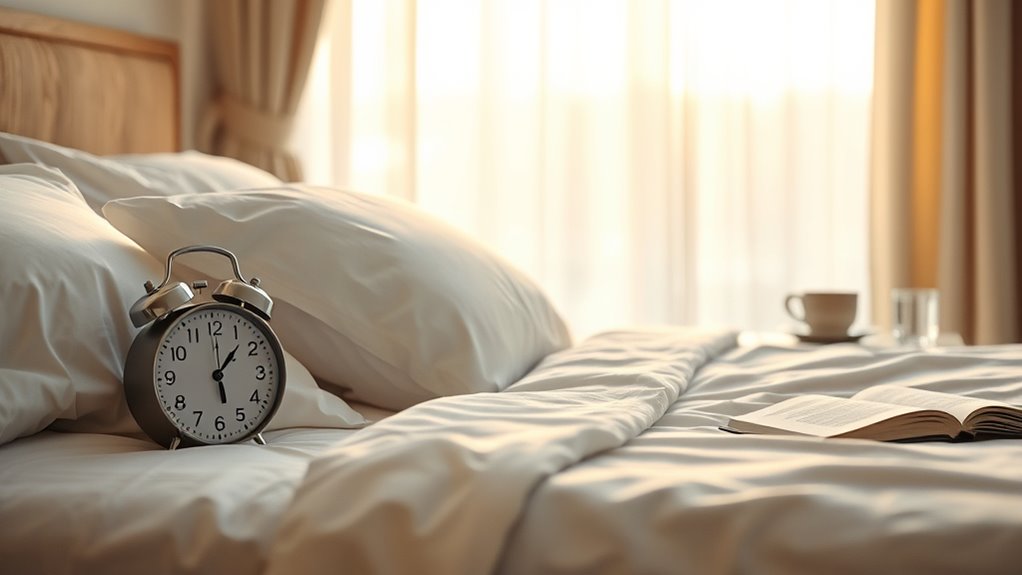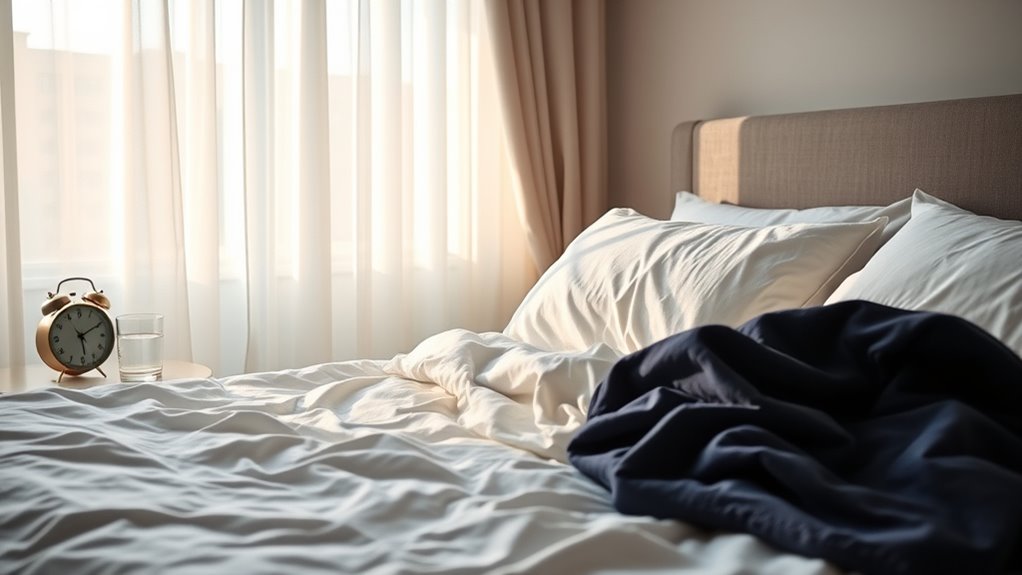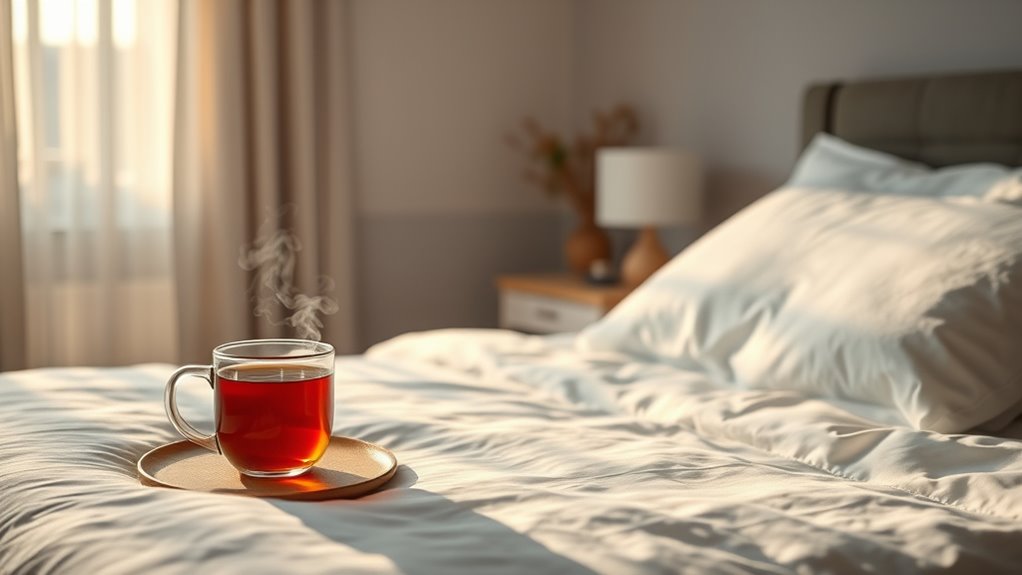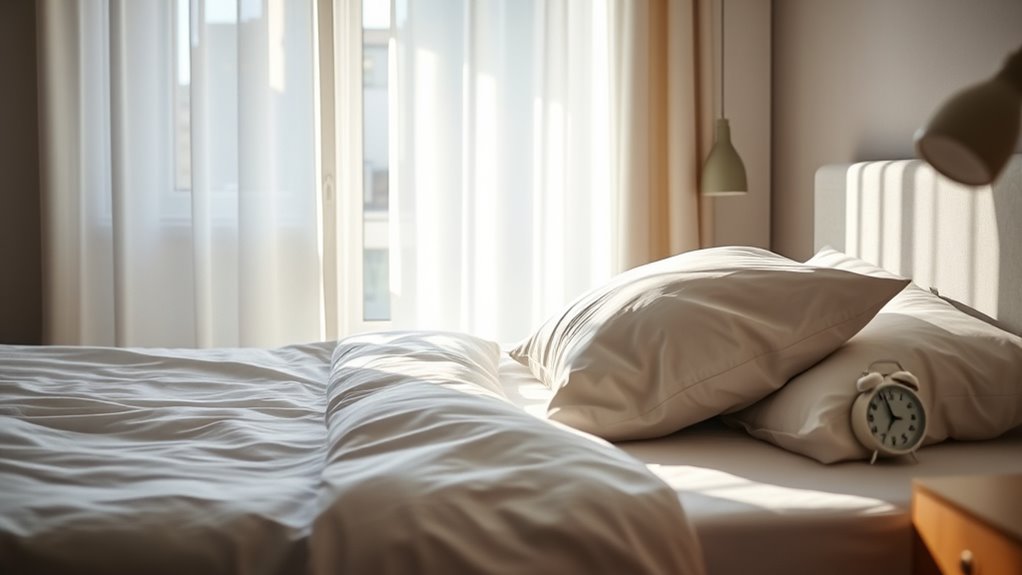Your sleep quality directly impacts your focus, mood, and decision-making at the start of the week. When you prioritize a consistent, restful sleep environment and avoid disruptors like screens and caffeine, you wake feeling more alert and motivated. Good sleep helps regulate your emotions and enhances creativity, making Monday less stressful. If you want to discover practical strategies to boost your sleep and upcoming performance, there’s plenty more to explore.
Key Takeaways
- High-quality sleep enhances cognitive function, focus, and decision-making, leading to better Monday performance.
- Consistent sleep routines stabilize circadian rhythms, reducing Monday morning grogginess and improving alertness.
- Restorative REM sleep supports emotional regulation, helping manage stress and boost motivation for the week ahead.
- Poor sleep environment and disruptors cause fatigue, impairing concentration and productivity on Monday.
- Addressing sleep issues before the weekend ensures adequate rest, setting a positive tone for the upcoming week.
How Sleep Affects Cognitive Function and Focus

Getting enough quality sleep is essential for maintaining sharp cognitive function and staying focused. When your sleep environment is optimized—cool, dark, and quiet—you create ideal conditions for restful sleep, which boosts your mental clarity. Dream analysis can offer insights into your subconscious, helping you understand stressors that might interfere with your rest. Poor sleep environments lead to fragmented sleep, reducing your ability to concentrate and process information effectively. Restorative sleep replenishes brain resources, sharpening your memory, decision-making, and problem-solving skills. Without enough restorative sleep, you may find it harder to stay attentive and make sound judgments, especially on busy Mondays. Prioritizing good sleep hygiene and exploring dream analysis can considerably enhance your cognitive performance and focus. Additionally, understanding your sleep patterns can help you identify habits that improve overall sleep quality and mental clarity. Maintaining consistent sleep schedules and avoiding screen time before bed are proven ways to support sleep quality and mental sharpness. Advances in AI-powered sleep tracking are also providing personalized insights to optimize your rest further. In fact, a well-designed sleep environment can significantly reduce disruptions and promote Restorative sleep, leading to better Monday performances.
The Impact of Restorative Sleep on Mood and Motivation

When you consistently enjoy restorative sleep, your mood tends to stabilize, and your motivation levels improve. Good sleep enhances your ability to recall dreams, which can boost emotional processing and self-awareness. Prioritizing sleep hygiene—like maintaining a consistent schedule and limiting screen time—sets the stage for deeper, more restorative rest. An adequate amount of quality sleep can also help regulate your body’s natural sleep cycles, leading to more restful nights. Sleep quality is also influenced by comfort solutions for sleep, which can reduce disruptions and promote continuous rest. Moreover, practicing mindfulness techniques such as Progressive Relaxation Techniques can further enhance your sleep quality by reducing physical tension before bed. Additionally, incorporating keto-friendly ingredients into your diet can support overall health and improve sleep quality by promoting balanced blood sugar levels. Imagine a table representing your sleep quality:
| Restorative Sleep | Mood & Motivation |
|---|---|
| Clear dream recall | Feel more positive |
| Deep sleep cycles | Increased motivation |
| Low sleep disruptions | Greater resilience |
| Consistent bedtime | Enhanced energy levels |
| Restorative mornings | Improved outlook on tasks |
When your sleep is truly restorative, you’re better equipped to face Monday with a balanced mood and heightened drive.
The Role of Sleep Cycles in Morning Alertness

Your sleep cycles, especially REM sleep, play a vital role in how alert you feel in the morning. The length of each cycle varies from person to person, impacting how rested you wake up. Understanding these cycles can help you optimize your sleep for better Monday mornings. Incorporating sleep cycle awareness into your routine can further enhance your overall sleep quality and morning alertness. Regularly tracking your sleep patterns can provide insights into your individual sleep cycle durations, allowing for more personalized adjustments. Additionally, maintaining consistent sleep patterns supports the body’s natural circadian rhythms, promoting more restorative sleep. Being aware of sleep cycle variations can help tailor your sleep schedule to maximize refreshment upon waking.
REM Sleep Significance
REM sleep plays a crucial role in determining how alert you feel in the morning, as it occurs in cycles that considerably influence your overall sleep quality. During REM, your brain is highly active, which enhances dream recall and helps process emotions. This stage is essential for mental restoration and memory consolidation, directly impacting your morning alertness. To maximize REM benefits, guarantee your sleep environment is comfortable and free of disruptions. A calm, dark, and cool space supports uninterrupted REM cycles. Keeping a consistent sleep schedule also helps stabilize REM timing. Additionally, maintaining healthy sleep habits can further improve your REM quality, leading to more restful nights. Creating a positive vibrational environment before sleep can also promote deeper REM stages, aligning with the Law of Attraction principles. Remember, neglecting REM sleep can lead to grogginess and reduced focus the next day. Prioritizing healthy sleep habits bolsters REM quality, so you wake up feeling more refreshed and alert on Monday mornings.
Cycle Length Variability
Sleep cycles, which alternate between REM and non-REM stages, vary in length from person to person and night to night. This variability in sleep cycle length impacts your morning alertness and cognitive performance. When your sleep cycle variability patterns are irregular, you might wake during deep sleep, leaving you groggy. Understanding sleep patterns can help you better anticipate your wake-up times and optimize rest. Consistent cycle lengths promote smoother progressions through sleep stages, leading to better rest and sharper mornings. Monitoring sleep cycle variability using sleep tracking devices can provide valuable insights to enhance your sleep quality. Recognizing the importance of circadian rhythms can further optimize your sleep schedule for improved Monday performance. Additionally, maintaining a consistent sleep schedule supports the regulation of your internal biological clock, which is crucial for overall sleep health.
Common Sleep Disruptors That Hinder Monday Performance

Many factors can interfere with restful nights and ultimately affect how you perform on Monday. A poor sleep environment, such as noise, light, or an uncomfortable bed, disrupts your ability to stay asleep. Stress and anxiety can lead to restless nights, while inconsistent sleep schedules throw off your body’s internal clock. Additionally, neglecting dream analysis may cause unresolved subconscious issues that interfere with sleep quality. Caffeine or alcohol consumption close to bedtime can also hinder deep sleep stages. Other common disruptors include screens before bed, which emit blue light, and physical discomfort. Addressing these issues by optimizing your sleep environment and understanding your dreams can help improve your rest, leading to better performance when Monday arrives. Incorporating elements of home decoration inspired by Italian espresso can create a calming space conducive to better sleep and relaxation. Moreover, investing in air purifiers with HEPA filtration can reduce airborne allergens and pollutants, creating a healthier sleep environment. Ensuring good sleep hygiene, such as a consistent bedtime routine, can further enhance sleep quality and support your Monday performance. Maintaining awareness of personal debt management is also vital, as financial stress can negatively impact sleep quality and overall well-being.
Strategies for Improving Sleep Quality Over the Weekend

To improve your sleep quality over the weekend, start by setting a consistent bedtime each night, even on days off. Reducing screen time before bed also helps your mind wind down and prepares you for restful sleep. Implementing these simple strategies can make a noticeable difference in how refreshed you feel on Monday morning. Incorporating calming activities such as gentle stretching or listening to soothing music can further enhance sleep quality, especially when combined with practices like color temperature adjustments to create a relaxing environment. Additionally, maintaining a consistent sleep schedule helps regulate your internal clock, making it easier to fall asleep and wake up feeling rested. Ensuring your sleep environment is free of distractions and at an optimal sleep environment temperature can also significantly improve sleep quality.
Establish Consistent Bedtimes
Establishing consistent bedtimes over the weekend can substantially enhance your sleep quality and help you wake up feeling more refreshed. When you stick to a regular schedule, your body adjusts, making it easier to fall asleep and wake up naturally. To support this, create calming bedtime rituals that signal to your brain it’s time to unwind. Also, optimize your sleep environment by keeping your room dark, quiet, and cool. Avoid sudden changes in your sleep schedule, which can disrupt your circadian rhythm. Consider these tips:
- Keep a consistent bedtime and wake-up time each day
- Develop relaxing bedtime rituals like reading or gentle stretches
- Maintain a comfortable sleep environment with minimal light and noise
- Limit caffeine and heavy meals close to bedtime
- Incorporate vetted sleep-friendly products like blackout curtains or white noise machines to improve your sleep quality
Sticking to these habits helps reset your internal clock for better Monday mornings.
Limit Screen Time Before Sleep
Reducing screen time before sleep is essential for improving your sleep quality over the weekend. Exposure to blue light from screens can interfere with your body’s production of melatonin, making it harder to fall asleep. To improve your sleep habits, set a digital curfew at least an hour before bed. Avoid scrolling through social media or watching videos, as these screen habits can disrupt your natural sleep cycle. Instead, opt for relaxing activities like reading a book or listening to calming music. Limiting blue light exposure helps your body wind down more effectively, leading to deeper, more restorative sleep. Consistent screen habits over the weekend can markedly enhance your sleep quality and prepare you for a productive Monday.
The Influence of Sleep Duration on Productivity Levels

Research shows that sleep duration directly impacts your productivity levels, with both insufficient and excessive sleep leading to decreased performance. When you get enough restful sleep, your dream recall improves, making it easier to process daily experiences. A balanced sleep duration also depends on your sleep environment, which influences how long and how well you sleep. Too little sleep leaves you groggy and unfocused, while too much can make you sluggish. To optimize your sleep for better Monday performance, consider:
- Maintaining a consistent sleep schedule
- Creating a comfortable sleep environment
- Allowing enough time for restorative sleep cycles
- Avoiding disruptions that interfere with sleep duration
The Connection Between Sleep and Stress Management

Getting enough restorative sleep helps your body recover and keeps stress levels in check. When you sleep well, your mind becomes better at handling daily pressures, reducing overall stress. Prioritizing quality sleep is a simple way to support effective stress management and improve your Monday performance.
Restorative Sleep’s Role
Because restorative sleep is essential for your body’s recovery, it plays a crucial role in managing stress effectively. When you get deep, quality sleep, your mind processes emotions better and enhances dream recall, which can provide insights into your stressors. Creating a peaceful sleep environment minimizes disruptions, allowing your body to enter restorative stages more easily. During these stages, your body repairs tissues and balances stress hormones. To support this, consider:
- Keeping your sleep environment cool, dark, and quiet
- Limiting screens before bedtime to reduce blue light exposure
- Establishing a consistent sleep schedule
- Practicing relaxation techniques to ease into sleep
Stress Reduction Benefits
Quality sleep directly reduces stress by helping your body regulate stress hormones like cortisol. When you get enough restful sleep, your body can better manage daily stressors, leaving you feeling calmer and more in control. Creating a comfortable sleep environment—dark, quiet, and cool—enhances this effect, making it easier to unwind. Incorporating techniques like dream journaling before bed can also help process worries and reduce anxiety, promoting a more peaceful sleep cycle. When your mind is calm, and your body is rested, stress levels decrease, setting a positive tone for the week ahead. Better stress management through quality sleep not only improves your mood but also sharpens your focus, making Monday mornings less overwhelming.
Tips for Establishing a Consistent Sleep Routine

Establishing a consistent sleep routine is essential for improving your overall sleep quality and ensuring you’re well-rested for the week ahead. To do this effectively, set a regular bedtime and wake-up time, even on weekends. Create a sleep environment that promotes rest by keeping your room cool, dark, and quiet. Incorporate relaxing activities like dream journaling before bed to clear your mind and signal your body it’s time to wind down. Avoid screens and caffeine close to bedtime, as they disrupt your sleep cycle. Consistency helps regulate your internal clock, making it easier to fall asleep and wake refreshed. Stick to these habits to build a routine that enhances your sleep quality and prepares you for productive Mondays.
The Effects of Sleep Deprivation on Decision-Making and Creativity

Sleep deprivation profoundly impairs your ability to make sound decisions and think creatively. When you don’t get enough rest, your brain struggles to process information clearly, leading to poor judgment and impulsive choices. It also hampers your creativity, making it harder to generate new ideas or solve problems innovatively. Your sleep environment plays a vital role; a noisy or uncomfortable space can worsen these effects. Dream analysis can reveal underlying stress or unresolved issues that disrupt your sleep quality, further impacting your cognitive functions. Without proper rest, your mind becomes less flexible and more prone to errors, which can negatively affect your Monday performance. Prioritizing a restful sleep environment helps preserve your decision-making skills and creative thinking, setting you up for a more productive week.
How to Recognize and Address Sleep Issues Before the Week Starts

When you recognize early signs of sleep trouble, you can take steps to prevent them from affecting your Monday performance. Pay attention to patterns like trouble falling asleep, frequent awakenings, or dreams that feel restless. To address these issues, consider keeping a dream journal to identify recurring themes or stressors disrupting your sleep. Improving your sleep environment is also vital—keep your room cool, dark, and quiet. Establish a calming bedtime routine, such as dimming lights or gentle stretching. Avoid screens before bed, and limit caffeine intake late in the day. These proactive measures help you spot and resolve sleep issues early, ensuring you wake refreshed and ready for the week ahead.
Frequently Asked Questions
How Does Sleep Quality Influence Long-Term Career Success?
Your sleep quality impacts your long-term career success by shaping your work habits and stress management skills. When you sleep well, you’re more focused, productive, and resilient to challenges. Good sleep helps you develop positive routines and make better decisions, leading to career growth. Conversely, poor sleep can cause burnout and hinder your ability to manage stress, ultimately affecting your professional trajectory over time.
Can Napping During Weekends Improve Monday Performance?
Weekend naps might seem like a small fix, but they can considerably boost your Monday performance. By engaging in sleep recovery through weekend naps, you give your body and mind a chance to recharge. This contrast between a busy week and restful weekends helps you start Monday refreshed and alert. So, don’t underestimate the power of those weekend naps—they can make all the difference in your productivity and mood come Monday.
What Role Does Technology Use Before Bed Play in Sleep Quality?
Your technology use before bed markedly impacts your sleep quality. Excessive screen time exposes you to blue light, which suppresses melatonin production, making it harder to fall asleep. To improve your sleep, try reducing screen time an hour before bed and use blue light filters or glasses. This helps your body relax naturally, leading to better rest and a more refreshed start to your Monday.
How Do Individual Sleep Needs Vary for Optimal Monday Productivity?
Everyone’s sleep needs are unique, like a gentle whisper guiding you to your best self. You discover that maintaining consistent sleep duration and regular sleep schedules helps you feel refreshed and alert. On Mondays, prioritizing your individual sleep pattern ensures you start the week energized. By listening to your body’s cues and keeping your sleep consistent, you set a steady foundation for a productive, balanced week ahead.
Are There Specific Sleep Patterns Linked to Better Problem-Solving Skills?
You might find that certain dream patterns, like vivid or recurring dreams, are linked to sharper problem-solving skills. Your sleep cycles, especially REM stages, play a key role in fostering these patterns. When you experience well-structured sleep cycles, you enhance your ability to process complex ideas and think creatively. Pay attention to how your dream patterns evolve, as they could signal peak brain function for tackling challenging problems.
Conclusion
Prioritizing good sleep might seem time-consuming, but it’s worth it for a sharper Monday. Even if your weekends are busy, small adjustments can make a big difference in your sleep quality. Don’t let stress or late nights sabotage your week’s start. By consistently improving your sleep habits, you’ll notice better focus, mood, and decision-making. Remember, investing in your sleep today sets a positive tone for the week ahead—so give yourself that essential rest.









